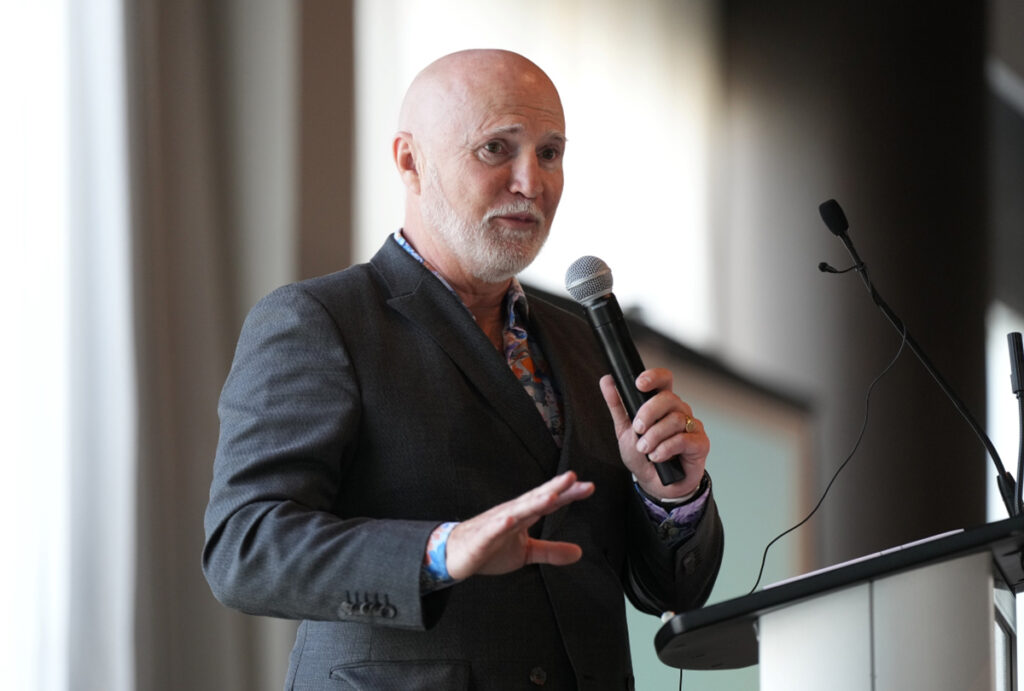Natural gas and LNG are elements needed more than ever, writes Resource Works CEO Stewart Muir in Business in Vancouver.

Resource Works founder and CEO, Stewart Muir, at a Resource Works event in 2022.
In an era of environmental angst, energy discussions have become battlegrounds of rhetoric and absolutism. Amidst the clamour for a post-carbon world, a fundamental energy source is being painted by some interests as an environmental pariah – natural gas, particularly in its liquefied form, LNG.
As the LNG 2023 conference in Vancouver approaches July 10-13 (it is a big deal, with organizers predicting up to 15,000 attendees) the narrative surrounding natural gas and its climate contribution has never been more pertinent.
Data from climate oracles such as the Intergovernmental Panel on Climate Change (IPCC) provide a grounding perspective on natural gas, especially with the public likely to be hearing contrasting points of view during LNG 2023. While I enjoy pondering the charts showing what global emissions of 2050 ought to be, I cannot overlook the charts showing humanity’s actual appetite for all forms of energy (hint: it’s gargantuan and growing). In fact, LNG is not the villain in this environmental fable, but a crucial player in achieving net-zero ambitions.
Renewables will definitely grow and in an accelerated fashion, but so will LNG, especially if it is low in greenhouse gas emissions, which happens to be a characteristic of the LNG being developed in Canada.
After Canada’s western premiers met in Whistler earlier this week, their statement firmly acknowledged the importance of exporting low or zero-emitting Canadian LNG to reduce global emissions. For political leadership across seven key jurisdictions — British Columbia, Alberta, Saskatchewan, Manitoba, Yukon, Northwest Territories, and Nunavut – to be backing this ambition is an extraordinary statement of purpose. Premiers, like energy planners, are tethered by the realities of the world and its soaring human demands, and they too must grapple with pragmatic solutions.
Premiers are also aware that despite the siren call to cast away fossil fuels entirely, the realities of such a leap are more complex and fraught than the sloganeers may have us believe. Natural gas, particularly LNG, serves as an eminently pragmatic transition fuel, evidenced by the coal-to-gas shift in the United States. As Canada’s gas exports to the U.S. rise, it’s clear that we’re not just key players in this decarbonization journey, but also potential pioneers for countries grappling with the stark realities of energy poverty.
LNG’s role as a bridge fuel is more crucial than ever for developing nations. Struggles with local scarcity, inadequate infrastructure, and logistics have often stymied their pivot to cleaner energy. However, LNG, with its logistical flexibility and relative abundance, can serve as the torchbearer in these regions, guiding them towards their climate goals without compromising their developmental aspirations.
Premiers have also, without a doubt, seen the polling trends that show Canadian voters intuit what is going on and are supportive. Earlier this year, I sat through a presentation in Ottawa where a well-known pollster told a Parliament Hill insider audience that, based on his firm’s research, there were no votes to be lost in Canada today for supporting LNG.
The basis for this belief is well founded. A glance at the burgeoning LNG Canada plant in Kitimat, slated for operations in 2025, exemplifies the climate potential of LNG. Its projected emissions reduction—equivalent to retiring 17 large coal-fired plants—underscores Canada’s capability to be a climate action heavyweight.
Yet, it’s not enough to merely champion LNG’s climate benefits. We must also grapple with the responsibility of ensuring its production, transportation, and usage remain environmentally acceptable. Canada’s national narrative on LNG is becoming an amalgamation of environmental leadership, economic pragmatism, and the pursuit of social justice. While climate considerations have spurred innovation in our gas industry, the engagement of First Nations in the LNG economy is a testament to the sector’s potential for fostering reconciliation.
It’s time to recognize that natural gas, and particularly LNG, is not the villain of our climate story, but a character we’ll need more than ever.
Stewart Muir is CEO of the Resource Works Society. This story was originally published in Business in Vancouver.
Share This:






